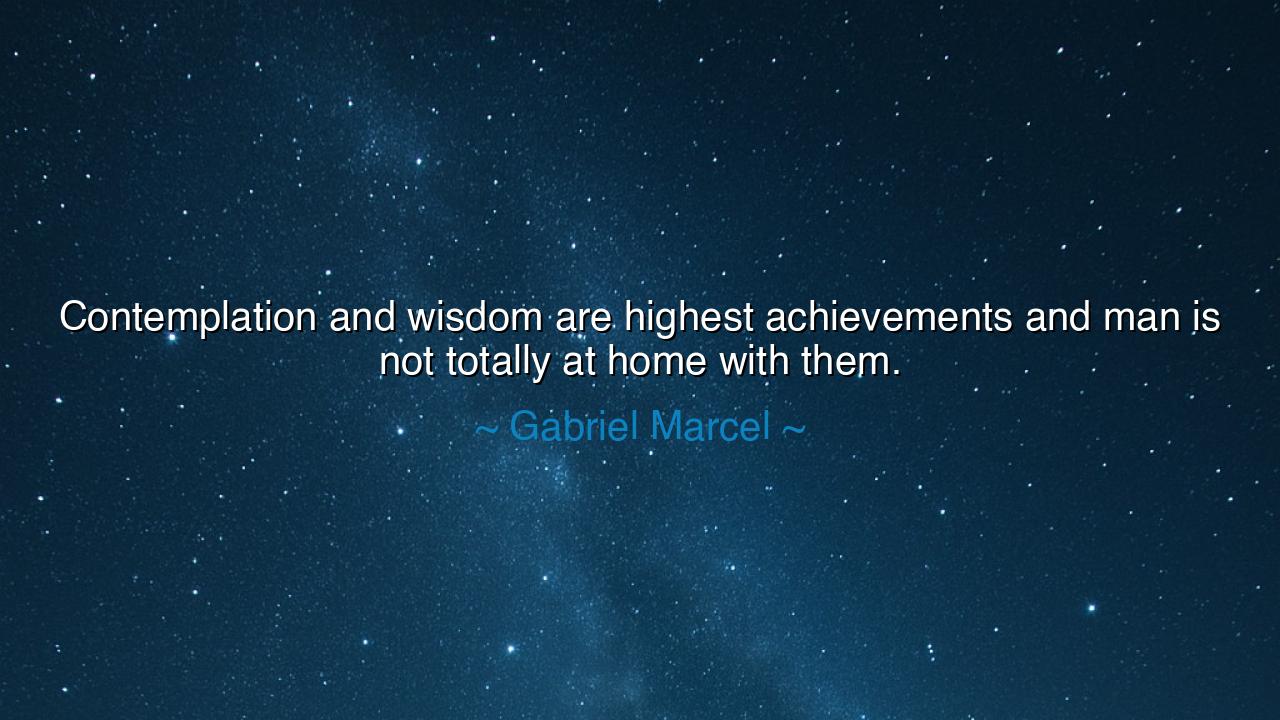
Contemplation and wisdom are highest achievements and man is not
Contemplation and wisdom are highest achievements and man is not totally at home with them.






When Gabriel Marcel wrote, “Contemplation and wisdom are highest achievements and man is not totally at home with them,” he spoke as one who had looked deeply into the heart of existence and seen both its majesty and its unease. These words are not merely philosophy — they are prophecy, revealing the tension that has always haunted humankind. For though contemplation and wisdom stand as the summits of the human spirit, man, restless and impatient, seldom lingers long upon those heights. We are creatures of striving and noise, and yet our truest calling whispers from silence. Marcel’s lament is that we have forgotten how to dwell there.
To contemplate is to behold — not to grasp, not to calculate, but to see. It is to turn one’s gaze inward and outward with equal reverence, to listen to life itself without demand or haste. The wise have always known that this act, though seemingly simple, is among the hardest labors of the soul. For in contemplation, one meets not only the divine but also oneself — stripped of distractions, masks, and illusions. To stand in such clarity is both exaltation and trial. Hence Marcel’s truth: that man “is not totally at home” with wisdom, for it asks of him what few dare give — stillness, humility, and surrender of pride.
The origin of this insight lies not in theory but in the lived experience of the philosopher himself, who lived through the ravages of two world wars. Amid the mechanization of life, the rise of technology, and the crumbling of spiritual certainty, Marcel saw that modern man had become estranged from being — that we rush to act, to produce, to dominate, but seldom to reflect. In this he discerned a universal exile: man had conquered the earth, but lost the ability to sit quietly beneath the stars. The very virtues that lift us — reason, ambition, progress — also scatter our peace. Thus, though contemplation and wisdom are our highest achievements, they are also the rarest, because they demand that we stop climbing and simply be.
In the ancient days, the sages of every land recognized this paradox. Socrates, who called himself the wisest of men, did not claim mastery of knowledge but rather the humility of one who knows he knows nothing. Buddha, too, reached enlightenment not through conquest or debate, but through stillness — seated beneath a tree in meditation. And yet both men were misunderstood by their times; one condemned to death, the other doubted until divine signs proved his awakening. The world has never been kind to those who dwell in contemplation, for their quiet threatens the frenzy of the many. Still, their lives stand as beacons, reminding us that to be wise is to live close to truth, even if the world mistakes it for idleness.
To be “not at home” with wisdom is, perhaps, to be human. The soul yearns for the eternal, but the body drags us toward the temporal. We are torn between heaven and earth, between the hunger to understand and the need to act. The farmer must till, the soldier must fight, the mother must labor — and yet, within them all, the spark of contemplation waits, flickering in the quiet hours. The tragedy is not that man cannot be wise, but that he forgets to return to that inner fire. Wisdom, after all, is not the abandonment of life, but the deepening of it — the art of seeing the divine in the mundane, the eternal in the fleeting.
We can see this truth even in the story of Marcus Aurelius, the philosopher-king. Surrounded by wars, politics, and betrayal, he ruled Rome with calm and dignity, his heart grounded in reflection. Each night he wrote in his journal — The Meditations — to steady his spirit amidst the chaos. Though burdened by empire, he found moments of peace in contemplation. He proved that even those who walk among turmoil can dwell, if only for a time, in wisdom’s stillness. And yet, like Marcel, he too confessed that it was not easy — that the mind longs for calm even as the world drags it back into struggle.
Therefore, O seeker, heed this teaching: contemplation and wisdom are the true crowns of the soul, but they must be earned anew each day. Set aside moments to be still — to listen, to wonder, to dwell in thought without aim. Turn from the constant motion of life and gaze inward, where truth quietly abides. You will find that peace is not something to be possessed, but a state to be remembered. Practice reflection as the ancients did — not as escape, but as restoration.
For though man may never be entirely “at home” in wisdom, it is the only home worth seeking. Our hands may build cities, but only our minds can build meaning. Our words may fill the air, but only silence reveals truth. So walk the world with purpose, yes — but let your spirit rest, now and then, upon the high mountain of contemplation. There, even for a moment, you will touch eternity — and though you may descend again into the noise of life, a part of you will remain forever at home.






AAdministratorAdministrator
Welcome, honored guests. Please leave a comment, we will respond soon